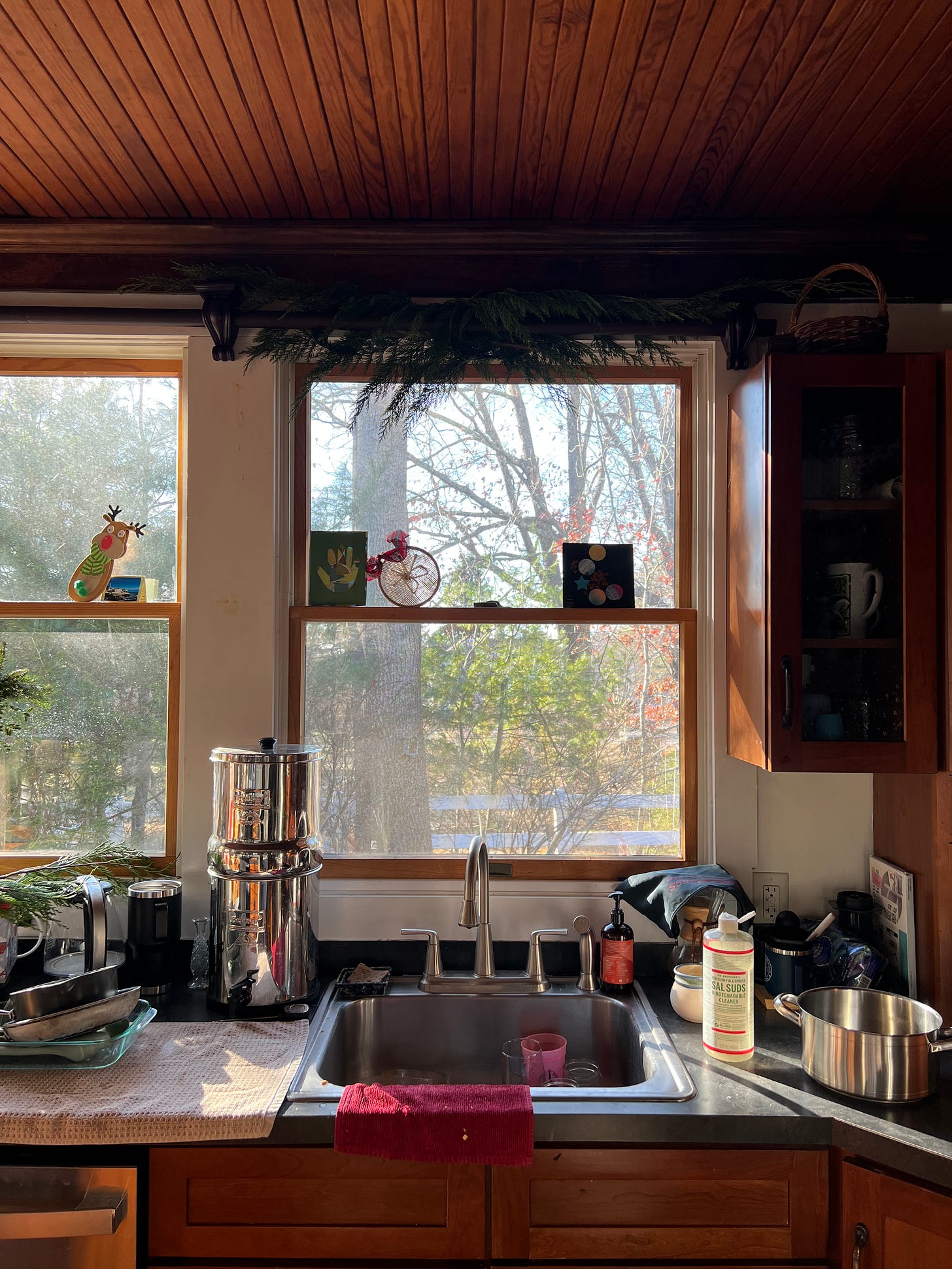In Practice: Placemaking at Home and at Church
Or what Women's Christmas tells us about hospitality
Dear friends,
Reorganizing our household after this move, at the precipice of the holidays, has dissolved every last crumb of liturgical perfection from my body. Put another way, I am bleary-eyed and threadbare. And just when I thought my body would be able to rest from the strain, I slip on the frosty front steps with baby in arms! (We’re just fine, though my tailbone is still pretty bruised.)
Nevertheless, placemaking, another word for home-making, is a necessity in a season where we’ve longed to feel settled. We unpacked much quicker last month than in May. I immediately pulled out photo frames and hung them in cozy corners and between windows. I tapped nails into any worthy wall. I knew it was important for my girls to see our family’s smiling faces framed at the dinner table.
We certainly wasted no time turning this new blank canvas into a home. The backdrop of Advent and the whole of Christmas was a sweet way to end a wild year and begin anew. With empty boxes piled around us we managed to make simple sugar cookies and apple pie, sip on hot chocolate, light candles, cobble together a tree, and cook a delicious Christmas menu. I sent out a small batch of Christmas cards. We inhaled the spicy sweetness of a simmer pot. Neighbors near and far left packages and baked goods on our doorstep. And, most importantly, we rested. Our new bungalow held many quiet afternoons as the four of us napped and read.
I’m more aware of my own fatigue this year than ever before. A post-birth hemorrhage, a heart arrhythmia, and two moves in twelve months are reminders my body has limits. The world is wrestling with its own frailty, too, by way of global and local confrontations with death and greed. This Twelfth Night feels more like a Friday after a whirlwind week. I’m ready to tuck myself in for the winter, pour myself another cuppa, and savor a long night or two.
How fitting, then, that Women’s Christmas, or Nollaig na mBan as it’s known in Irish, offers rest on the last night of Christmastide? This lesser known tradition swaps the conventional holiday roles of men and women. Women are given a night “off” while men cook a traditional supper of goose and take down decorations. Wives, daughters, sisters, and friends gather to cherish their own particular Christmas with the last of the tea and cake. Modern interpretations might see women off to a pub or hotel for a time of holiday respite.
I love an opportunity for good cheer and lovely fellowship. After the usual seasonal ceremonies of the past few months ‘placemakers’ need a closing ceremony for themselves. If I lived near some of my closest friends for a night like this, you can be sure we’d trade stories and swear off this or that for next year’s festivities. We’d laugh and hug and comfort each other over spilled milk. You wouldn’t need to tell me twice to get lost.
Ideals aside, I have a few questions. The oversimplified ratio of twelve days of cooking, hosting, wrapping, cleaning, sorting, sending, singing, etc. to one measly day of rest is terrible. When the women came home or returned to the hearths, was everything truly put away? Was the holiday really tied up neatly for next year? Is it only a woman’s role to plan, host, and execute holiday traditions and only a man’s role to tear it all down? Must the women give the men a gold star for their goose dinner?
Liturgically, the tradition of Women’s Christmas sits right on the cusp of Christmas and Epiphany, where the celebration of Jesus’s birth unfolds into proclamation of Christ’s identity. Epiphany points to this holy manifestation and names the truths hidden beneath the surface. This miraculous child is not just an anomaly, but a divine act of revelation. The reality of Christ’s identity reveals our original belovedness, as well the wounds in need of healing.
Beneath the (delightful) surface of Women’s Christmas is a pressing conversation of gender roles, hospitality, tradition, the mental load of it all, and more I’m sure to miss. From the perspective of placemaking Epiphany urges us to live into the reality of the Incarnation: Christ offers himself as an eternal home for all and therefore hospitality is a shared responsibility of all believers. This home is furnished with peace, mercy, gentleness, and justice. All who accept this invitation and step across the welcome mat are to offer the same loving-kindness given to them.
From the first news of Christ’s conception to resurrection, women have long been the engines of faith: church planting, ministering to the poor, instructing young and old, fueling potlucks, worshiping with extravagance, and tending to administrative responsibilities. They’ve fundraised, ironed the linens, and made copies. But are women truly at home in the church?
Women, especially Gen Z gals, are becoming less and less affiliated with religion in historic numbers. Before scrolling down to the researcher’s commentary I could already list several reasons why this would be so in Christian circles. This recent shift is a result of a thousand cuts. Access, albeit limited access, to ordained ministry is relatively new in church history. The presence of individual and systemic cases of abuse is a significant fracture in the church’s credibility. So too are the misguided theological campaigns in the name of sexual or political purity, which perpetuate victim blaming, shame, and hatred. It’s no wonder why women are putting off church. The church has become inhospitable.
As a spiritual director, much of my work is shaped by spiritual hospitality. I’ve heard a number of stories from women in the past few years. Their experiences line up with the data: women are searching for something different than what they’ve inherited. More than a night off, they’re looking for a place where their wisdom and leadership is received joyfully, where their questions are held without judgement, where the vulnerable are protected and supported, and where they can be strengthened in our collective worship of God.
This reflection really only scratches the surface, but I can tell you this form of hospitality is deeper and richer than free coffee on a Sunday morning. Engaging a renewed vision for the body of Christ — one that values partnership, safety, trust, and reciprocity — begins with the openness of spiritual hospitality, as well as the warmth of a physical environment. This practice is contextual, just like the spectrum of hospitality we see around the world, but it always includes humility, holy curiosity, and a generous spirit. And at the root of this vision, we find Christ, a man who transcends cultural expectations of gender, inviting all of humankind to “abide with” him in a home he has prepared for us, as Our Homemaker.1 This heavenly home has an earthly reality, one echoing through the season of Epiphany and the daily humdrum of life. Can you hear it?
Reflect:
How can you practice spiritual hospitality this week?
Consider a time when you received the gift of hospitality. What was that like for you?
Currently Reading:
New & Noteworthy:
Find me and my husband as guests on 3 episodes of Bedtime Chapel, a podcast for families looking to establish rhythms of prayer. Our first podcast appearance ever! (Listen here: Episode 1, 2, and 3.)
Related Resources:
Find the handy dandy one page liturgical calendar in the Library.
Write (or refresh) your Rule of Life with this three part series.
An older post on offering spiritual hospitality as a spiritual director.
A couple weeks ago I came across the work of Frederick Dale Bruner who describes Jesus as “our homemaker” based on John 15:4. Also see John 14.







Thank you for your writing. You have very nice prose. Great ideas as well.
You are challenging me with the idea of spiritual hospitality, friend! I will be chewing on this for a while. Thank you for the nudge!